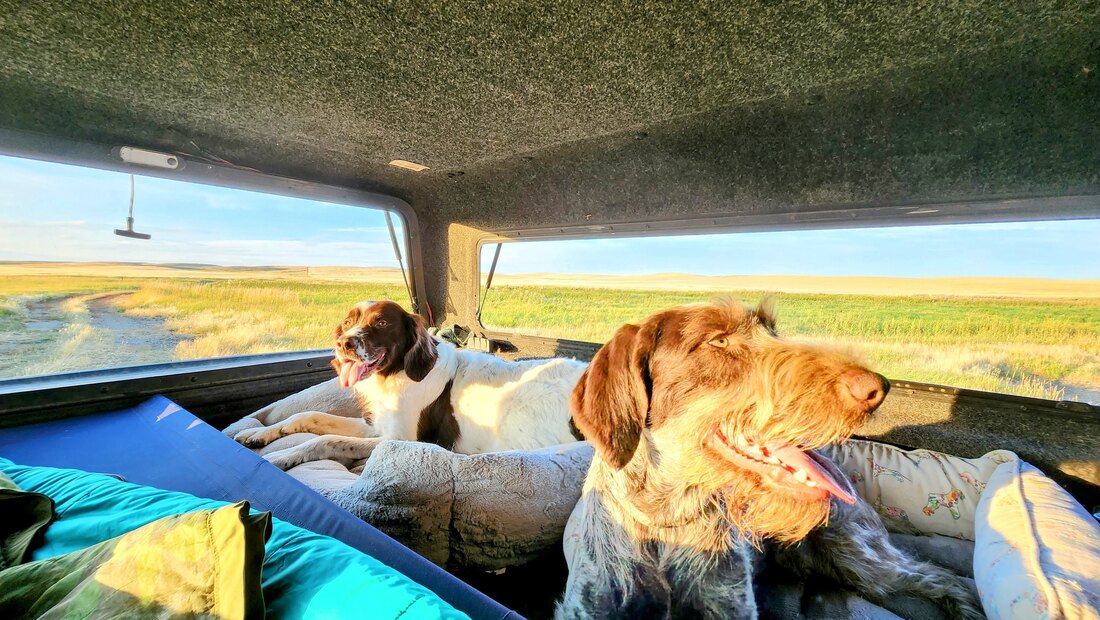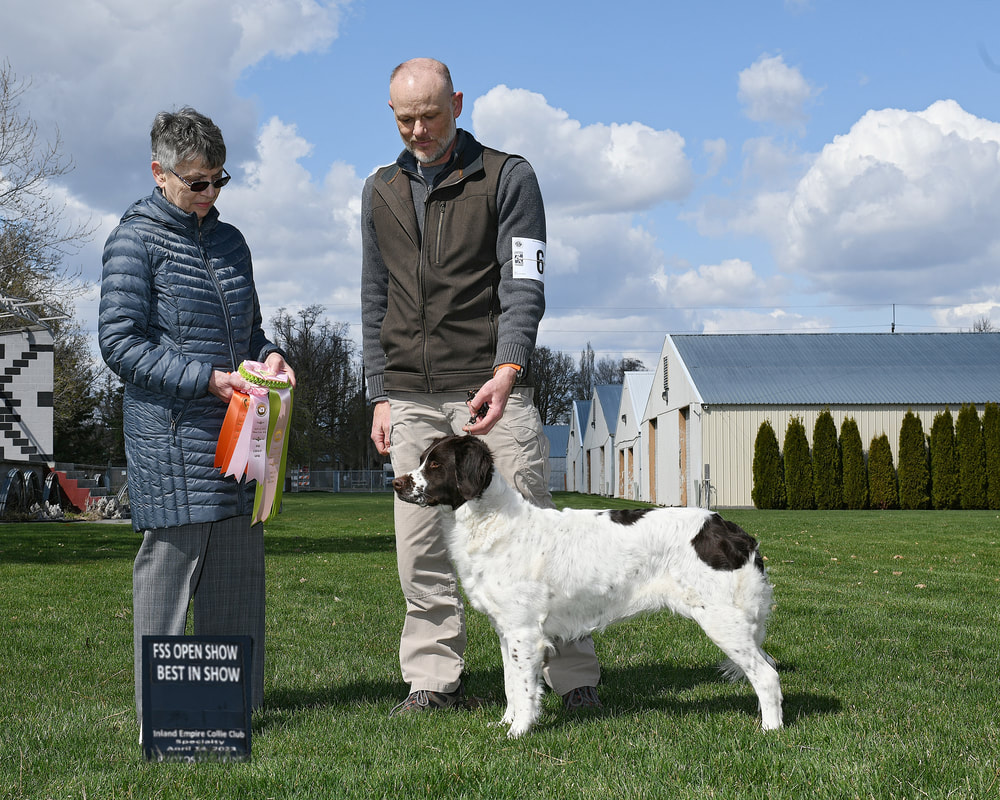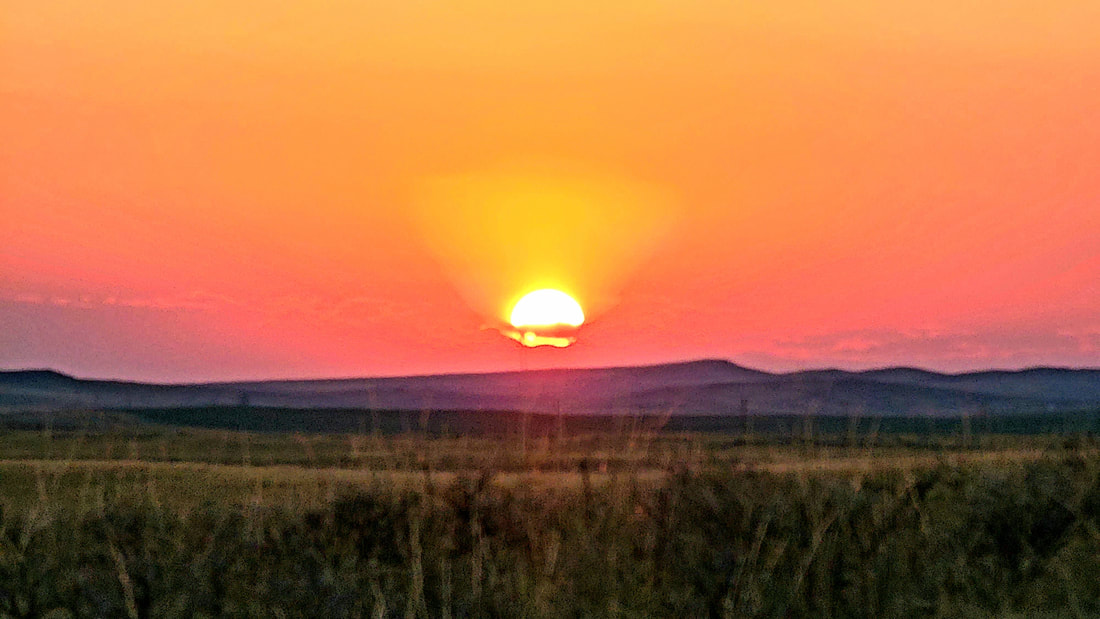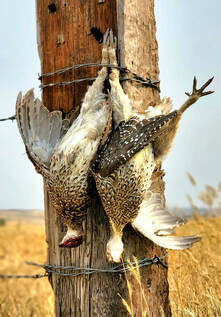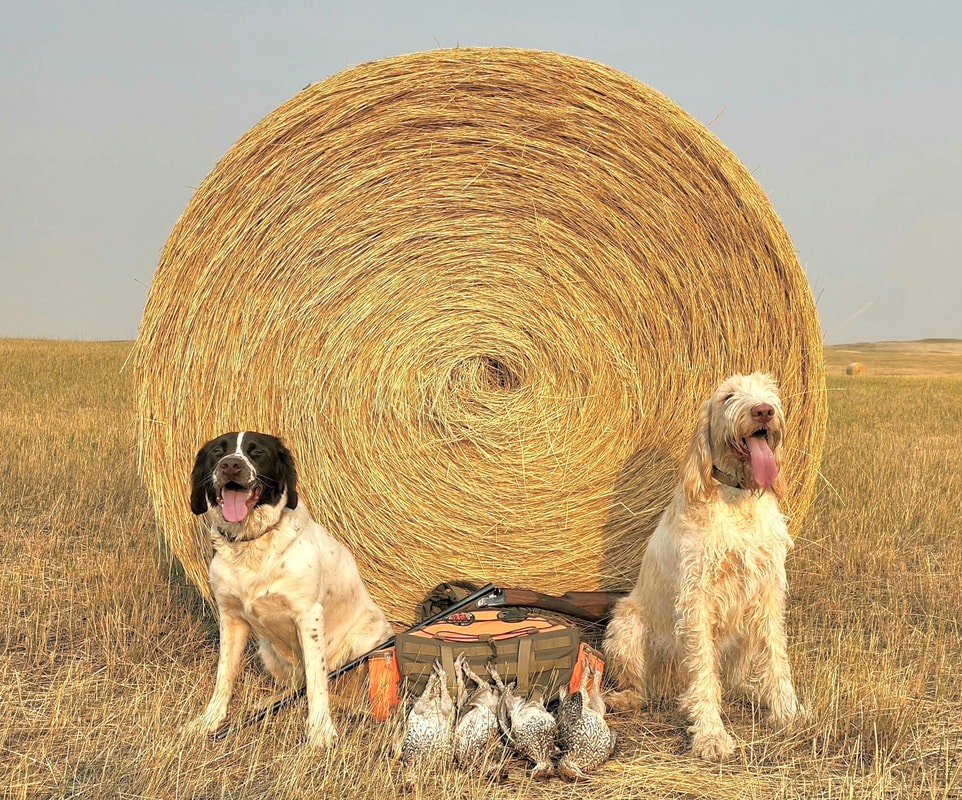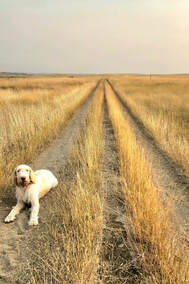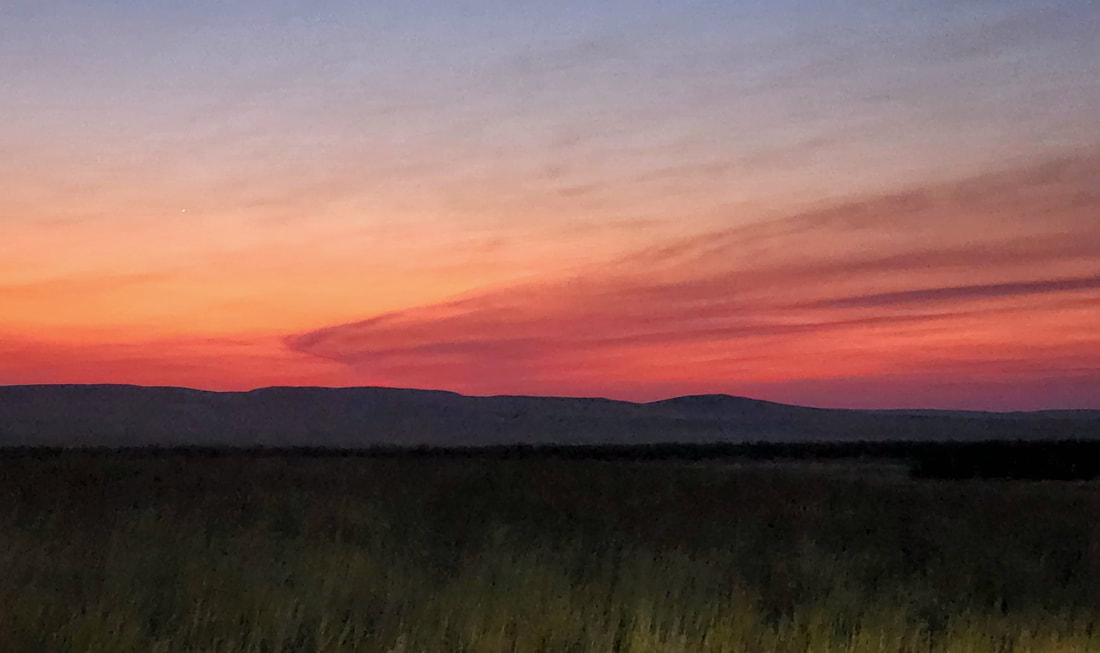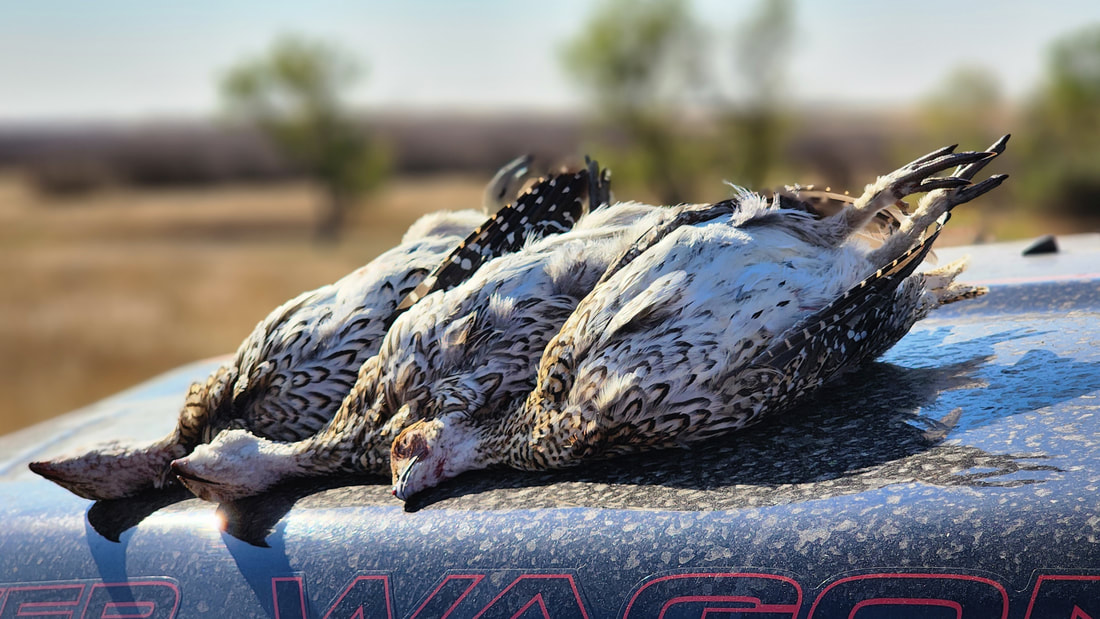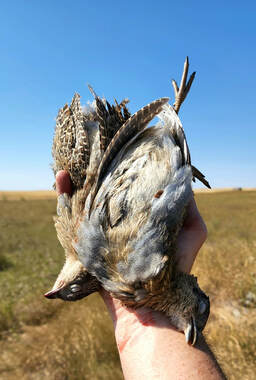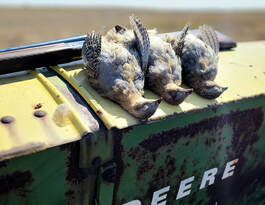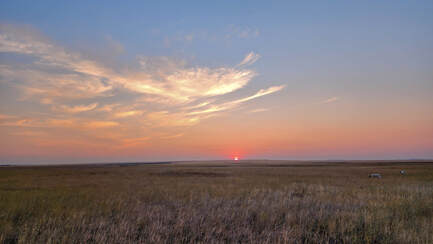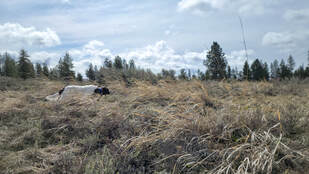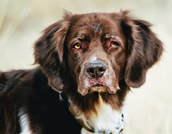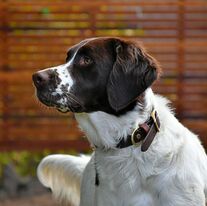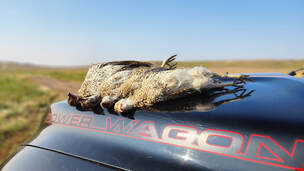 What a grand time we had! Now that is out of the way, I’ll share a few details with you. I took Powder and Rye on the paired down, lean camping trip for Sharptail and Hungarian Partridge in Northeastern Montana. These early season hunts have marked temperatures in the 90’s, which limits how long you can be out running dogs even more so than the relatively low limit on Sharptail. However, if your shooting is on point, your day can be closed out in a matter of minutes! We camped within a quarter of a mile of the Canadian border. With the windows on the truck canopy fully open to allow the breeze to cool us and blow the flies out, we were gifted with the occasional call of a Sharptail. I had indeed picked a good spot! Later that night we had a “Blue Super Moon”, which Rye wasn’t too sure of. She did her due diligence to ward it off initially, but in the end she settled to watch it carefully while Powder and I slept. 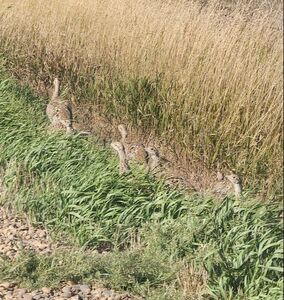 In the morning we were hunting directly at legal light and were in birds a few minutes later. The girls did their job, and I did mine – we were on the board with our first Sharpie. The covey flew a short way uphill, landing at the fence line directly below where a large raptor had been roosting. Our presence kept the raptor from doing what it wanted to do, and amidst the confusion, the grouse flushed again over the hilltop and to the Northwest. I thought perhaps they had landed short to take advantage of the better cover, but I was wrong. The covey rose as a group out of range. As soon as we resumed our walk, that is when a much larger covey just a little way further up the hill took flight – well out of range. Popcorning to the sky, easily 30 birds if not more. They wanted nothing to do with us. Once they were gone, Rye was still standing… 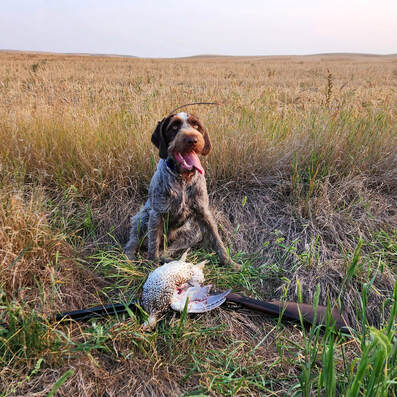 We looped around the wheat field to hunt the lower portion of the hills to the south. I zigzagged into and out of the various levels of cover for a while then settled on a little higher elevation where a dozen or more deer had been resting. Right in the middle of where the deer had been camped out the girls got birdy. Powder swung wide and to my left. Rye stayed pretty much right in front of me only about 40 yards out, and went on point as soon after the “good cover” turned scrapy and thin. Her tail was vibrating vigorously, so much so it appeared she was flagging! I approached her, and stroked the underside of her tail to steady it. Her body tensed and birds started to fly. Rye stood. I shot and took a bird. Looked to Rye, where she still stood, and I took another shot toppling our third bird of the day, and a true covey rise double. Rye still stood. I was beaming and remembered to shout, “hunt dead”. Powder had begun to retrieve the second bird first, which they carried in together. The softer hit first bird evaded us for a while, but it was Rye who found the young male for me in some deep cover! 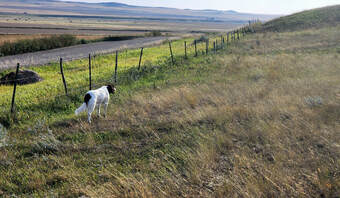 Barely five minutes later we were into another covey. Powder was first on the scene. She bumped them, and three or four birds came up. The girls were steady, so I shot and subsequently missed. Powder gave a little chase, and more birds came up. Then a few more. On the last of the covey, both girls stood smartly, and I took a passing shot on a Sharpie with it’s warp drive online and managed to dump it. Rye located the bird and retrieved it to within a few feet and set it down. I’ll take it. She has been reluctant to retrieve whole birds, despite enjoying retrieving all sorts of unusual items. It has to start somewhere! By the time we had made it back to the truck, the heat was up, and becoming quite oppressive. We ate our breakfasts, and I got to make my coffee. We spent the rest of the day scouting for a new camping spot and hunting grounds. 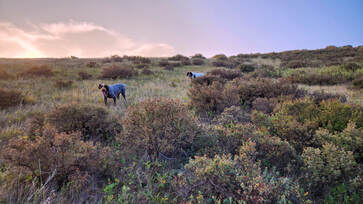 Sparing you some of the agonizing detail, day two was also an equally great day of hunting and dog work, in particular from the puppy, Rye. We had six coveys of Sharptail within 600 yards of the camp and had my shooting been half as good as opening day we would have been shut out within fifteen minutes of starting our day! But alas, my hit ratio took irreparable damage for the season… Of note, Rye offered to honor Powder a couple times without any intervention or encouragement. Day three we camped near to the Canadian border again, and had another great day of hunting, dog work, and shooting! Later that morning I got invited to hunt with a couple of friends a few hours away. Me being who I am, and being easily confused with my days and dates left the area 24-hours before I should have… None the less visiting with Eddy and Anita is always a treat, so I have no regrets for making time to visit with them. We left for the mountains the following morning for Rye to have a chance on Blue Grouse – she didn’t disappoint! 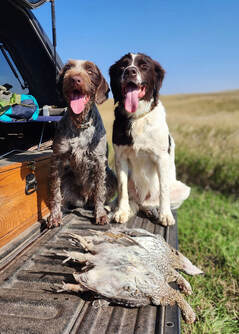 The longer I have been into upland hunting, the more I have gotten into quality dog work. It is fun to watch and be a part of. Additionally, it’s safer for the people and dogs involved and typically offers the easiest/best shooting opportunities that can be had for the situation at hand. My journey to learn highly effective and humane techniques has been fairly well documented here in this blog. As I have slowly gained proficiency as a trainer and handler over the years, my dogs have also become better and better in their performances. One hand washes the other. Making the whole experience more and more rewarding. Next, we depart for a special opportunity to hunt Sage Grouse in the Steens Mountains of Oregon… possibly another story will need to be told?
0 Comments
In memory of Fowler: 10 May 2010 - 26 April 2023 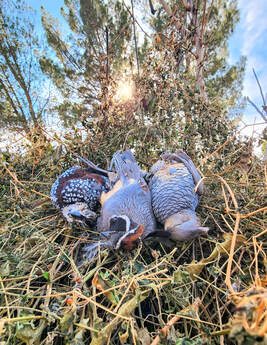 Since you are reading this, it is a safe bet we are back in cold, dark, and wet Spokane and we are no longer in the business of shoveling sunshine and hunting quail in the high desert. I could make this the shortest recap ever: we had a great trip. But then that isn’t a lot of fun now, is it? A week prior to heading South for the big Pheonix dog show, Jenna had gone to Oregon to help our friend Stacey. It was an eventful stay, and to say the least, Stacey was helped, as was Mr. Kim & Laura. A made for TV drama if there ever was one. As an added kicker, she contracted COVID and it hit her while on the 9-hour drive home. Jenna did a turn and burn move, and we left with her having barely 24 hours at home. It is a full twenty-hour drive from Spokane to Pheonix, and all was going well until we were about five hours out – the VID hit me like a freight train, and I had to pull off the road. Driving was no longer possible for me. Day one I missed the dog show, then life began to return to me. We wore our masks, and stayed away from people, which was pretty easy to do at the enormous West World horse pavilion. Ila did pretty good in her Open shows, and Fizzy did well in all of hers, as we have come to expect. After the show cluster ended, we headed further South and got started with some desert quail hunting. 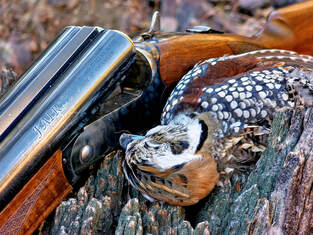 My buddy Jacob had invited us to check out an area he liked for desert quail, and it turned out to be an amazing time. In the low spots there were Gambles quail in abundance, on the ridges, there were plentiful numbers of Scaled quail. Wow! I even took a Scamble, a primarily Gambels quail with Scaled quail feathers on its chest – super cool! The different species in this location literally were a few yards apart in many places, very easy for overlapping and Scambling to happen. Good times were had, and we are still grateful for the opportunity to hunt such a cool place. With the Mearns opener on the horizon and a hunting buddy from Spokane coming down to fulfill a lifelong goal of hunting Mearns quail – we were hyper focused on getting into birds. Not just hunting our usual coverts. But to continue something we started last year. Jacob and I had a friendly competition running on finding new and unique coveys. I had stopped marking coveys a long time ago, and had just hunted haphazardly here and there, and many times into the most rugged and insane habitat the birds would live in. A sure-fire way to find birds in the hard and down years. After a few friendly jabs, I started marking my covey finds last year. We ended that season with over 80 new to us finds, which was pretty cool. More importantly it got us thinking more deliberately about where we hunted, and how we hunted the areas we did hunt. We were never really keen on repeating hunts, even in the tough years, but this new game really got us thinking. 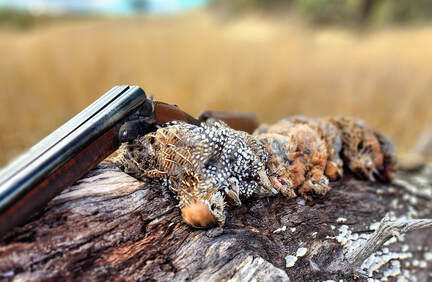 Jenna and I spend our summers training, showing, and fooling around with our dogs, but also, we have an unusual hobby of tracking rainfall for the areas we prefer to hunt in Arizona. Mearns quail populations are tied directly to the summer monsoons. So, knowing when and where the rain fell would likely help us to produce more finds. One might think this would be easy since rainfall data can be found with relative ease on the internet… but not if the primary area you hunt, over a million acres, doesn’t have any rain gauges! We use a myriad of odd sources, and spend time watching the active weather radar, which helps us to identify areas of interest. I then draw borders on these areas in OnX for us to go and investigate using boot leather. This past season was a high-water mark with how extremely systematic we were with this approach. In all we located and identified over 140 new and unique coveys for us during our thirty days of Mearns hunting. We did hunt a few Old Hunts so our total covey count was a good bit higher, but what really interests us is the “new to us” category. It serves to validate our methodology and makes the exploration into the unknown even more rewarding. We rarely hunt past noon, that more or less makes us “half-day” hunters down there. Say what you will, but we aren’t there to make money. Making it back to the house by one or two in the afternoon to eat, shower, relax, and enjoy some of what the area offers is also part of the package for us. We are proud of what we do and how we do it, one or two dogs on the ground at a time, a casual pace, and short-ish days. If you are running three or four dogs at a time, doing a crew swap at lunch to have fresh dogs on the ground and hunting until dark – well, I’d hope you are finding more – better yet, do some better hitting and you’ll have to stop! Most folks I compare notes with find much fewer coveys and spend a good bit more time walking…but I digress. 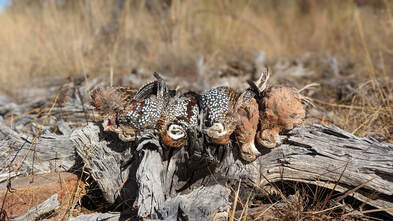 We’ve also always kept a soft count on covey finds for each dog, but this year, and the number of birds we were finding got a little more serious in this department as well. The Leader Board Emerged. We established a few easy rules. Coveys would be counted even if the dog made errors, it just happens e.g. bumping. If we were running two dogs and they both pretty much tied into the covey at the same time both got credit. If one was on a covey first, they got solo credit, the backing/cooperating dog was along for the ride. We joked about figuring out a handicap in the event a dog with a bunch or errors passed a dog with few to none…it was close, but it didn’t happen. So, for now that will remain a project for another day. You may find the results surprising. The Old Guy Fowler came in last, but also with the fewest days hunted by far, with 14 coveys. Tule was 4th with 15 coveys. The Queen of Mearns Hunting (8 seasons), Powder, came in 3rd, with 35 coveys. Ila was second with 51 coveys. Fizzy, in her 2nd hunting season, came in 1st with 54 coveys – also with the fewest errors by far! What does it all really mean? Well, having several months to reflect on this I can say we had a grand time! We hunted with new and old friends, had dog work I couldn’t have dreamed of just a few years ago. I my shooting was always on point (that’s a joke kids), and at times it was the things that fuel the creation of colorful memes, but I also had days where my hitting was literally the stuff that gets written into song. If I never had a Mearns season like this past, at least I had it as an incredible high-water mark to remember contemplatively while enjoying some fine libations with the sun on my face. Hello friends! I realize I have been entirely derelict with making regular posts, and even getting the couple I promised finished and posted. I am still nibbling away at them - I promise. We took a year off from producing a litter for ourselves, to catch up on life and to do some things we had been meaning to do but couldn't because we had a litter on the ground. If you follow @TwoGunKennels or @Two_Gun_Kennels any, then you have a few ideas of what we have been up to...
One of the things we have been wanting to do is work on Ila's Certificate of Merit, as close to a Champion title a breed in the AKC's FSS can aspire to within that system (aside from multiple CM's). The preponderance of Open Shows in our region take place in the spring when she would have puppies on the ground. Even then, there just aren't many offered, and most are four or more hours away... The few remaining Open Shows are sporadically offered during the time she drops coat, and frankly looks her worst. We had a nice weekend at the Moses Lake show cluster where we all did well, with multiple group placements for all the dogs we had entered. However, Ila was given the opportunity to make history again! That's right, last summer, with a rough coat, she was the first female Drent to win a Best in Open Show (BIOC, Best in Open Conformation - yes, it is a bit confusing...), and as of Friday, 14 April 2023 she is the first female Drent to win multiple Best in Open Shows in AKC History! Another proud breeder moment: so far, our paternal line coming down from Esp. Ch. Joksan NABAR the Gloucester has produced all the AKC's Best in Open Show winners to date. Not a lot to say, other than we had an exciting time and definitely found our share of birds. We hunted hard and the girls did some excellent work and upped their game to meet the edginess of the mid-season birds. Not to be mistaken for the puppy friendly early season birds... Each dog was able to work and point Pheasant, Hungarian Partridge, and of course, Sharptailed Grouse on this blitz style 5-days of hunting trip. Sadly, I started off by missing some great opportunities to take game I had been gifted with. However, I managed to find my mojo at an undisclosed location and started filling the bag and completing great hunting sequences for the girls - which was nice. Here are a few shots, in no particular order, from the trip. During hunting season, we have been taking some time to moonlight for Sage Canyon Outfitters guiding discerning clients on preserve hunts. I get to hunt the girls at least twice a day for some really good folks. The sets are rather generous, and we can easily expect 25 to 50 points per hunt... tailgate photos are about half the birds taken on each hunt (I must do a drop and call for support). Tule likes to sneak in for the group shots, while Ila and Powder prefer to lay in the shade and drink water, Fizzy tends to be all business unless there is mud to roll in. Here are only a few of the group photos from that vigorous five days! Enjoy
Mountain grouse, as they are called in Montana, are not for those weak in the knee or faint of heart. Sure, you don't need to be in Boston Marathon shape, but that would help a lot. I stayed with my longtime friend and we hunted with our collective friend who is seventy-six years of age! I hope to be at it like him when I get there! The easiest Dusky Grouse habitat in their area isn't really easy. You just take it easy, one step at a time, and trust the dog(s) to do their work. Since we don't sluice birds off the ground or out of trees, the shooting is a real challenge and means hard found birds can be lost as they make their escape through thick cover. A change in temperatures for the better, read coolerr, got the broods moving and we made good contact each day. Ila had injured a toe on the last day of her prairie hunting, and so it was eighteen-month-old Fizzy who hunted every day from the start to the end of the trip. Ila did get to hunt in the mountains for the morning hunt before we left town.
I got into birddogs later in life, but I have always been nutz about dogs, to include their training, learning, and later their conformation/structure, breeding and so on...
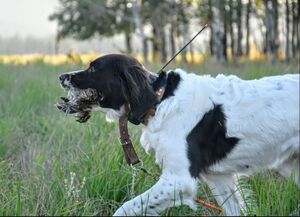
My Air Force career kept me from doing many of the things I wanted to do with my dogs. Long hours, working on my days off, deployments, travel, etc. A real sob story. So being able to do the "field work" I wanted to do with them was a far-off dream. These days, as long as things are working halfway decently, "playing with my dogs" is what I do.
Powder was initially trained by Dan Hoke of Dunfur kennels just outside of town. Dan is a GSP guy and has a field trail resume few can equal. Moreover, when Dan was a young fellow, he was an apprentice to Sigbot "Bodo" Winterhelt - The Bodo Winterhelt! Dan is a gifted dog handler for sure, and I will forever love watching him handle a dog I believe. He has a gift that is just magical! Still, he wasn't able to steady Powder up for whatever reason. 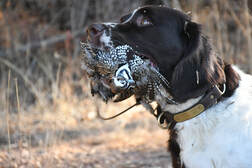
Powder has been a great companion to me. She is MY dog without question, and well in tune with me as one would hope (expect) from a Medical Alert Service Dog. In the field she has been a consistent producer, best yet she has become more proficient with each passing year. I have always wanted to do more with her steadiness for a long time now and this summer finally presented the opportunity I have been looking for!
This little video is kind of a big deal since Powder has spent most of her life treating gunfire in the field the same way Usain Bolt treated a starter's pistol sounding off! I had hoped to work on this last season, but she was injured, then pregnant, and went straight into hunting season just after the pup left. At 8 years of age, and only 4 dedicated training sessions for her this training season she now understands being steady to wing, shot, and release. So here we are, Team Hunting with Tule and Powder. This is their first co-session together. Tule did a great job of supporting Powder's initial point, so I gave her permission to come up and establish her own point, which she took advantage of. They worked well (even though Powder was a bit slippery as I walked in) and were nice and steady, overall, I'm really happy with them both. We use structure over force and high pressure. For her to demonstrate this level of steadiness with another dog in the mix is pretty awesome. |
Categories
All
Our YouTube Content
Two GunI'm just a guy suffering with an infatuation with gundogs since childhood. Forty some years later this is what you get. Archives
July 2024
|
|
|
